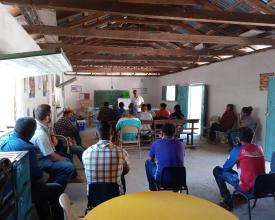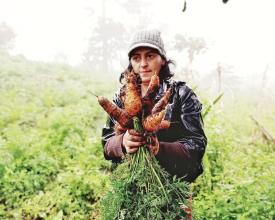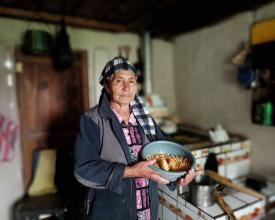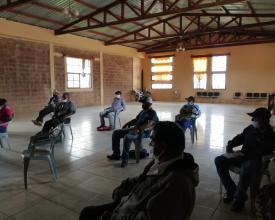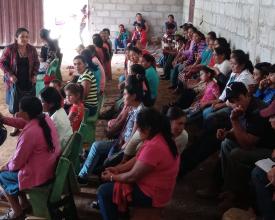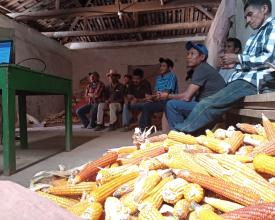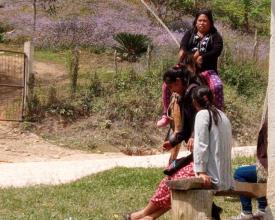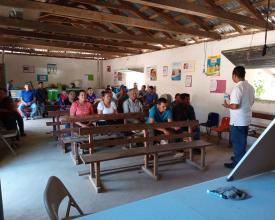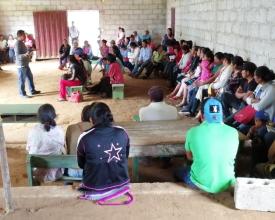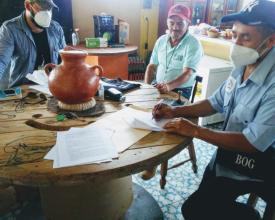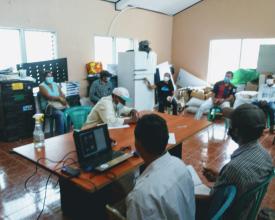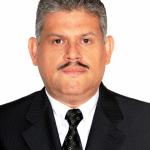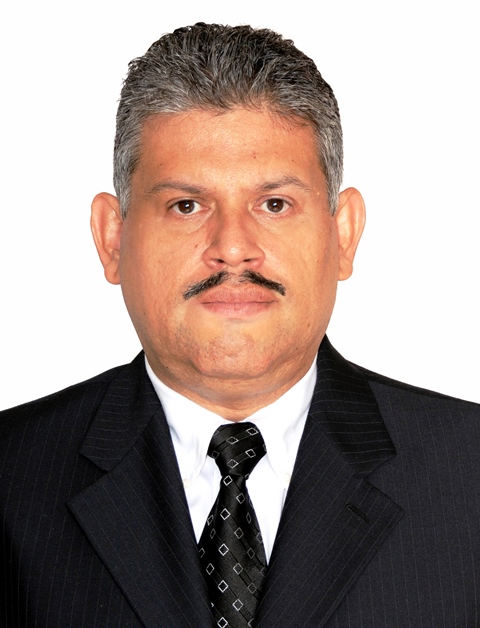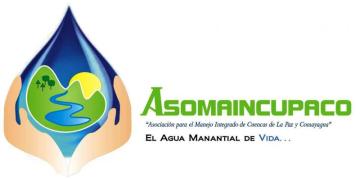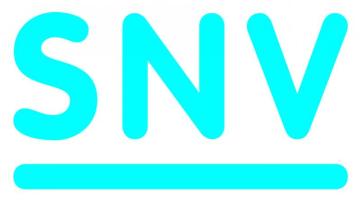
Lenca community consulted in a prior, free and informed manner, consents to the implementation of AFCI-PRA.
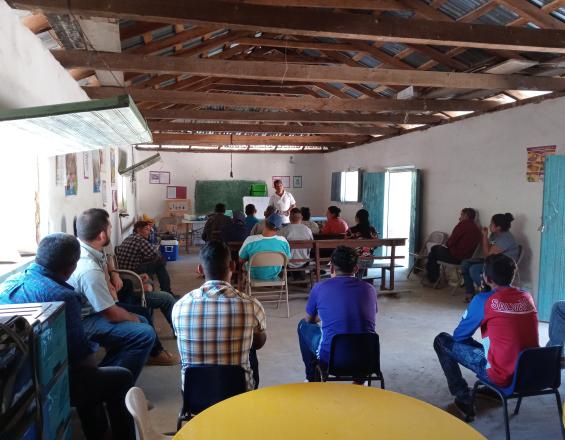
The CPLI is part of the due diligence process established by SNV to implement projects with indigenous peoples. The objective is to incorporate elements of governance of the peoples, their customs and worldview on natural and cultural resources, in the project implementation strategy in accordance with indigenous rights over their territories and harmonized with national legislation and the immediate context of the communities.
The process seeks to know the activities that the communities habitually carry out, the way in which they do them, what potential these activities have to be incorporated into the project, what weaknesses they present that need to be overcome, the threats they face, and analyze how all these conditions will be addressed by the project. As an added value of the solution, the "Ethnographic Diagnosis" tool was incorporated into the solution and the "identification of Lenca ancestral Best Practices for Resilient Food Production" was carried out.
Context
Challenges addressed
In the area of influence of the project there is a dynamic and complex local context, so it was necessary to address the following risks and challenges:
- Consultation carried out after project approval. During the consultation, the Lenca communities were presented with a project with objectives and goals already defined and approved by the donor, which raised some doubts about the role of Lenca leadership in the project.
- Contradictions between actors: There were strong contradictions between the visions of municipal authorities and indigenous organizations, and between the latter and the community councils, so that an inadequately planned and executed consultation process could have become a risk for the credibility of the executors and for the deepening of the contradictions between local and indigenous authorities.
Location
Process
Summary of the process
The "preparation of the FPIC" creates the methodological conditions to develop the process in a prudent and organized manner, anticipating the challenges posed.
The "consultation process" is conducted according to the previous building block. First, a broad socialization allows to assess the scope of the project. Then, an ethno-cultural and gender diagnosis of the Lenca communities allows to know the state of the social fabric, their ancestral productive practices, their relations with other actors, with which the consultation is structured. This is developed giving the opportunity to the whole community to participate.
Finally, during the "obtaining of consent" a process of reflection is opened, in which there are still spaces for consultations on the part of the communities until they decide to grant or deny consent. Once obtained, the consent is disclosed, emphasizing the commitments of the project with the communities to reinforce the level of trust and guarantee the active participation of the communities in the execution of the project.
Building Blocks
Preparation of the Free, Prior and Informed Consultation (FPIC)
For the inception phase of the Project and based on the analysis of the local context, the process of Free, Prior and Informed Consultation with the Lenca Communities was planned and designed.The preparation of the FPIC consisted of selecting the methodological tools and instruments that, validated in the institutional practice of the SNV, would allow for consultation in an environment conducive to overcoming the challenges imposed by the work in the project's area of influence, characterized by partiality and foreign interests that generated distrust or the perception of partiality to the project.
Enabling factors
- Availability of methodological tools and instruments to carry out FPIC (socialization and consultation methodology, ethnography, etc.) and openness to their adaptation to environmental conditions.
- Work experience and positive reputation with indigenous communities of reference to initiate contacts.
- Social capital with the Lenca communities of the executing partner ASOMAINCUPACO in the area of influence of the project and SNV in other areas of the country.
Lesson learned
- Indigenous organizations do not necessarily represent or are not necessarily considered legitimate by the communities, even when a certain part of the community has organized around them.
- The interference of foreign actors or political purposes generates distrust in local authorities, which means that despite good intentions, they are not well received by the communities.
- Social capital and institutional reputation are key to overcoming the ruptures in the community social fabric because they allow for a minimum level of trust on which to structure the consultation process.
Broad Socialization and Consultation Process
In order to avoid generating expectations or contradictions among the different stakeholders in the area of influence, prior to the consultation process with potential beneficiaries, a broad process of socialization of the project was carried out with local authorities, indigenous organizations, community representatives, describing the project, its scope and coverage.
A diagnosis of the situation of the Lenca communities was then carried out in order to strengthen knowledge of their culture and determine probable approaches for consultation.
Based on the diagnosis and socialization, we proceeded to shape the process of direct consultations with the communities about the project, its implications and the potential participation of the communities.
Enabling factors
- Hiring of a consultant of Lenca origin, familiar with and experienced in the methodology and procedures of the executing organization (SNV).
- Networking and favorable contacts with different actors and community leaders of the co-executing organization (ASOMAINCUPACO).
- Broad consultation, without exclusion and open to adapting project activities to meet the suggestions of the consulted communities.
- Respect for indigenous organizations, but at the same time, giving space to unorganized communities or parts of them.
Lesson learned
- It is necessary to give the necessary time for the communities to mature the information provided to them in the consultation process.
- Broad socialization creates an "environment of trust" and gives a transparent image of the project in terms of its scope.
- It was relevant for the communities that the project contemplated the rescue of their ancestral climate-resilient practices and respect for their internal governance.
Obtaining consent, project adjustment and communication
Once the communities have been consulted, a process of internal reflection is opened, without the participation of the executing organizations, through which the communities decide whether or not to give their consent to the project and define their degree of participation in the project based on their interest in it.
During the reflection, if any doubts or clarifications arise, the consultant is at the disposal of the communities to inform them, without recommending or intervening, but only providing information. During this stage, the communities express, if necessary, recommendations within the framework of the project activities.
In accordance with the communities' internal governance processes, they give their consent and sign a document in the presence of invited stakeholders such as local authorities and leaders of indigenous organizations. The event is covered by local and national media.
Enabling factors
- The adaptive management of the project, with openness to recommendations as well as sincerely explaining the reasons why demands cannot be satisfied.
- Allowing time for reflection, without conditions or limitations so that the communities can decide whether or not to participate in their own governance, or to condition it.
- The degree of trust built from socialization to the consultation process with communities is fundamental for obtaining consent.
Lesson learned
- It is important not to pressure the communities to decide whether or not to give their consent; it is preferable to reschedule or extend the execution time than to obtain an undesired result.
- Socialization, consultation and consent generate expectations in the context of the project that the project can meet, so community participation becomes active.
- Maintaining communication with the communities makes them persevere in the project activities and makes it possible to overcome difficulties that may arise, in this case the effects of the pandemic and tropical storms.
Impacts
In the context of a complex social dynamic, the solution generated empathy and trust with the project, without accentuating the internal division between indigenous organizations and integrating the Lenca cosmovision in the implementation strategies and promoting their resilient ancestral agricultural traditions and strengthening the communities' capacities in terms of indigenous rights.
In the short term, the main impact was the creation of a favorable environment through the free consent of the indigenous councils to the implementation of the project and the inclusion of the Lenca worldview in their intervention strategy and the recognition of their form of government, their ancestral agricultural practices for the PRA, all of which will contribute to the dissemination, adoption and sustainability of the processes, practices and technologies promoted by the project.
In the long term, the solution can be the starting point for a consensus between local and indigenous authorities and between these and the indigenous community councils, which can contribute to the participatory construction of a common agenda that strengthens the social fabric and concerted decision-making on the common goods of each community.
Beneficiaries
The direct beneficiaries are 3,199 Lenca indigenous producers of basic grains, coffee and livestock, in vulnerable conditions settled in the El Venado and Chiflador micro-watersheds, department of La Paz, of which 1,490 are women and 1,790 are men.
Sustainable Development Goals
Story
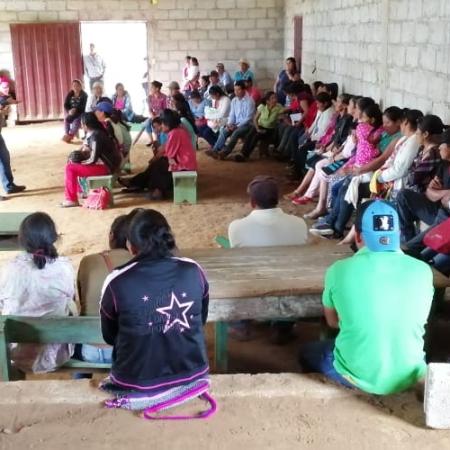
Ms. Keidy Mariéla Sánchez Melgar, President of the Water Administration Board, community of Agua Zarca, Municipality of Cabañas, said about her experience with the project: "As a Lenca indigenous woman I feel happy that since this project, the participation of women and not only men has been taken into account, they gave us the opportunity to participate and give our opinions, as Lenca women we had never been consulted when a project arrived, but this time they gathered us as an indigenous council and consulted us; which was very important for us, since they respected our culture and took into account our traditions and proposals to help the project".
On the other hand, the President of the Lenca Indigenous Council of the community of Bailadero, Cabañas, Mr. Jeremías Nolasco García, said "we have had a lot of information about the project since its inception, they have been very close and we like the respect for Convention 169, the idea that the project will benefit 50% of the indigenous peoples and the respect for our ancestral practices, our customs and for us".

